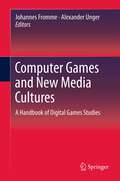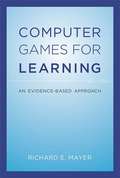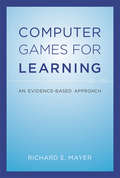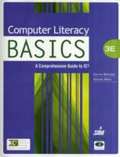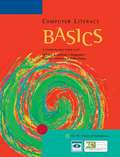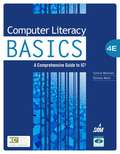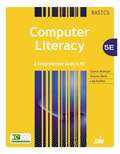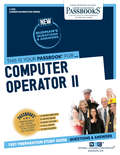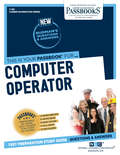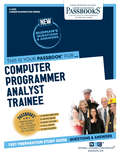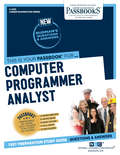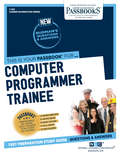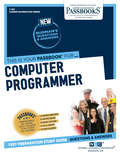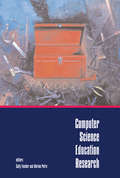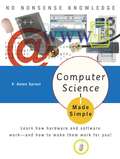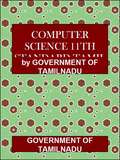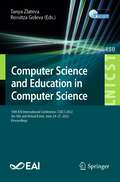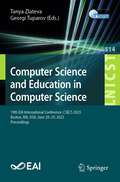- Table View
- List View
Computer Games and New Media Cultures: A Handbook of Digital Games Studies
by Alexander Unger Johannes FrommeDigital gaming is today a significant economic phenomenon as well as being an intrinsic part of a convergent media culture in postmodern societies. Its ubiquity, as well as the sheer volume of hours young people spend gaming, should make it ripe for urgent academic enquiry, yet the subject was a research backwater until the turn of the millennium. Even today, as tens of millions of young people spend their waking hours manipulating avatars and gaming characters on computer screens, the subject is still treated with scepticism in some academic circles. This handbook aims to reflect the relevance and value of studying digital games, now the subject of a growing number of studies, surveys, conferences and publications. As an overview of the current state of research into digital gaming, the 42 papers included in this handbook focus on the social and cultural relevance of gaming. In doing so, they provide an alternative perspective to one-dimensional studies of gaming, whose agendas do not include cultural factors. The contributions, which range from theoretical approaches to empirical studies, cover various topics including analyses of games themselves, the player-game interaction, and the social context of gaming. In addition, the educational aspects of games and gaming are treated in a discrete section. With material on non-commercial gaming trends such as 'modding', and a multinational group of authors from eleven nations, the handbook is a vital publication demonstrating that new media cultures are far more complex and diverse than commonly assumed in a debate dominated by concerns over violent content.
Computer Games for Learning
by Richard E. MayerMany strong claims are made for the educational value of computer games, but there is a need for systematic examination of the research evidence that might support such claims. This book fills that need by providing, a comprehensive and up-to-date investigation of what research shows about learning with computer games. Computer Games for Learning describes three genres of game research: the value-added approach, which compares the learning outcomes of students who learn with a base version of a game to those of students who learn with the base version plus an additional feature; the cognitive consequences approach, which compares learning outcomes of students who play an off-the-shelf computer game for extended periods to those of students who do not; and the media comparative approach, which compares the learning outcomes of students who learn material by playing a game to those of students who learn the same material using conventional media. After introductory chapters that describe the rationale and goals of learning game research as well as the relevance of cognitive science to learning with games, the book offers examples of research in all three genres conducted by the author and his colleagues at the University of California, Santa Barbara; meta-analyses of published research; and suggestions for future research in the field. The book is essential reading for researchers and students of educational games, instructional designers, learning-game developers, and anyone who wants to know what the research has to say about the educational effectiveness of computer games.
Computer Games for Learning: An Evidence-Based Approach (The\mit Press Ser.)
by Richard E. MayerA comprehensive and up-to-date investigation of what research shows about the educational value of computer games for learning. Many strong claims are made for the educational value of computer games, but there is a need for systematic examination of the research evidence that might support such claims. This book fills that need by providing, a comprehensive and up-to-date investigation of what research shows about learning with computer games. Computer Games for Learning describes three genres of game research: the value-added approach, which compares the learning outcomes of students who learn with a base version of a game to those of students who learn with the base version plus an additional feature; the cognitive consequences approach, which compares learning outcomes of students who play an off-the-shelf computer game for extended periods to those of students who do not; and the media comparative approach, which compares the learning outcomes of students who learn material by playing a game to those of students who learn the same material using conventional media. After introductory chapters that describe the rationale and goals of learning game research as well as the relevance of cognitive science to learning with games, the book offers examples of research in all three genres conducted by the author and his colleagues at the University of California, Santa Barbara; meta-analyses of published research; and suggestions for future research in the field. The book is essential reading for researchers and students of educational games, instructional designers, learning-game developers, and anyone who wants to know what the research has to say about the educational effectiveness of computer games.
Computer Integrated Manufacturing for Sixth SEM B.E Mechanical Engineering
by Prof. Bharat VinjamuriComputer Integrated Manufacturing For VTU BE 6th Sem Mechanical Engineering
Computer Integrated for Sixth SEM B.E Mechanical Engineering
by Prof. Bharat VinjamuriComputer Integrated for Sixth SEM B.E Mechanical Engineering.
Computer Literacy BASICS: A Comprehensive Guide to IC3
by Dolores Wells Connie MorrisonBring your computer literacy course back to the BASICS. COMPUTER LITERACY BASICS: A COMPREHENSIVE GUIDE TO IC3 provides an introduction to computer concepts and skills, which maps to the newest Computing Core Certification (IC3) standards. Designed with new learners in mind, this text covers Computing Fundamentals, Key Applications, and Living Online - everything your students need to ace the IC3 exam, and finish the course as confident computer users.
Computer Literacy Basics: A Comprehensive Guide to IC3
by Ann Ambrose Connie Morrison Dolores Wells-Pusins Donald Busche Marly BergerudComputer Literacy BASICS provides an introduction to computer technology and concepts. This text maps to the IC3 standards and is organized into three key components: Computing Fundamentals, Key Applications, and Living Online. It provides thorough instruction on the various uses of the computer, important accessories, networking principles and covers key applications such as word processing, spreadsheets, and presentation applications. In addition, Computer Literacy BASICS covers e-mail and Internet principles such as managing e-mail and contacts, searching for a topic online, and how computers affect every day life. Strong end-of-chapter exercises and review material reinforce important topics covered in the lesson and allow students to demonstrate their knowledge of the material.
Computer Literacy Basics: A Comprehensive Guide to IC3
by Dolores Wells Connie MorrisonCOMPUTER LITERACY BASICS: A COMPREHENSIVE GUIDE TO IC3 covers Computing Fundamentals, Key Applications, and Living Online - everything your students need to pass the IC3 exam, and finish the course as confident computer users.
Computer Literacy Basics: A Comprehensive Guide to IC³
by Dolores Wells Connie Morrison Lisa RuffoloBring your computer literacy course back to the BASICS. COMPUTER LITERACY BASICS: A COMPREHENSIVE GUIDE TO IC3 provides an introduction to computer concepts and skills, which maps to the newest Computing Core Certification (IC3) standards. Designed with new learners in mind, this text covers Computing Fundamentals, Key Applications, and Living Online - everything students need to pass the IC3 exam, and finish the course as confident computer users.
Computer Operator II: Passbooks Study Guide (Career Examination Series)
by National Learning CorporationThe Computer Operator II Passbook® prepares you for your test by allowing you to take practice exams in the subjects you need to study. It provides hundreds of questions and answers in the areas that will likely be covered on your upcoming exam, including but not limited to: operation of computer hardware and peripheral equipment; reading and interpreting instructions relating to the execution of computer programs; supervision; work scheduling; and more.
Computer Operator: Passbooks Study Guide (Career Examination Series #C-708)
by National Learning CorporationThe Computer Operator Passbook® prepares you for your test by allowing you to take practice exams in the subjects you need to study. It provides hundreds of questions and answers in the areas that will likely be covered on your upcoming exam, including but not limited to: operation of computer hardware and peripheral equipment; reading and interpreting instructions related to the execution of computer programs; and more.
Computer Programmer Analyst Trainee: Passbooks Study Guide (Career Examination Series)
by National Learning CorporationThe Computer Programmer Analyst Trainee Passbook® prepares you for your test by allowing you to take practice exams in the subjects you need to study. It provides hundreds of questions and answers in the areas that will likely be covered on your upcoming exam, including but not limited to: logical reasoning including figure analogies and flowcharts; reading comprehension; arithmetic skills including number sequences; interpersonal relations; and more.
Computer Programmer Analyst: Passbooks Study Guide (Career Examination Series #C-3218)
by National Learning CorporationThe Computer Programmer Analyst Passbook® prepares you for your test by allowing you to take practice exams in the subjects you need to study. It provides hundreds of questions and answers in the areas that will likely be covered on your upcoming exam.
Computer Programmer Trainee: Passbooks Study Guide (Career Examination Series)
by National Learning CorporationThe Computer Programmer Trainee Passbook® prepares you for your test by allowing you to take practice exams in the subjects you need to study. It provides hundreds of questions and answers in the areas that will likely be covered on your upcoming exam.
Computer Programmer: Passbooks Study Guide (Career Examination Series #C-159)
by National Learning CorporationThe Computer Programmer Passbook® prepares you for your test by allowing you to take practice exams in the subjects you need to study. It provides hundreds of questions and answers in the areas that will likely be covered on your upcoming exam, including but not limited to: programming techniques and concepts; systems analysis and concepts; data processing concepts and terminology; logical reasoning using flowcharts; preparing written materials; and more.
Computer Science Education Research
by Marian Petre Sally FincherThis book provides an overview of how to approach computer science education research from a pragmatic perspective. It represents the diversity of traditions and approaches inherent in this interdisciplinary area, while also providing a structure within which to make sense of that diversity. It provides multiple 'entry points'- to literature, to me
Computer Science Made Simple: Learn how hardware and software work-- and how to make them work for you! (Made Simple)
by V. Anton SpraulBe smarter than your computer. If you don't understand computers, you can quickly be left behind in today's fast-paced, machine-dependent society. Computer Science Made Simple offers a straightforward resource for technology novices and advanced techies alike. It clarifies all you need to know, from the basic components of today's computers to using advanced applications. The perfect primer, it explains how it all comes together to make computers work. Topics covered include: * hardware* software* programming * networks * the internet * computer graphics * advanced computer concepts * computers in society.
Computer Science Volume - 1 Concepts 11th Standard - Tamilnadu Board
by Training State Council of Educational ResearchComputer Science Textbook Volume - 1 Concepts for the 11th Standard Students, preparing for Tamil Nadu State Board Exam.
Computer Science Volume - 1 Tools 12th Standard - Tamilnadu Board
by Training State Council of Educational ResearchComputer Science Textbook Volume - 1 Tools, for the 12th Standard Students, preparing for Tamil Nadu State Board Exam.
Computer Science Volume - 2 Object Technology 12th Standard - Tamilnadu Board
by Training State Council of Educational ResearchComputer Science Textbook Volume - 2 Object Technology, for the 12th Standard Students, preparing for Tamil Nadu State Board Exam.
Computer Science Volume - II Practice 11th Standard - Tamilnadu Board
by Training State Council of Educational ResearchComputer Science Textbook Volume - II Practice for the 11th Standard Students, preparing for Tamil Nadu State Board Exam.
Computer Science Volume 1 class 11 - Tamil Nadu Board
by Government Of Tamil NaduTo acquire a fundamental knowledge on the subject of COMPUTER SCIENCE and to understand its nature and scope; and, To understand the meaning of some of the basic concepts of COMPUTER SCIENCE and to observe how they are applied in the various definitions formulated on thescience of COMPUTER SCIENCE.
Computer Science Volume I class 11 - Tamil Nadu Board - SCERT: கணினி அறிவியல் தொகுதி 1 தமிழ்நாடு அரசு மேல்நிலை முதலாம் ஆண்டு
by Government Tamilnaduunderstand its nature and scope; and, To understand the meaning of some of the basic concepts of COMPUTER SCIENCE and to observe how they are applied in the various definitions formulated on the science of COMPUTER SCIENCE.
Computer Science and Education in Computer Science: 18th EAI International Conference, CSECS 2022, On-Site and Virtual Event, June 24-27, 2022, Proceedings (Lecture Notes of the Institute for Computer Sciences, Social Informatics and Telecommunications Engineering #450)
by Rossitza Goleva Tanya ZlatevaThis book constitutes the refereed post-conference proceedings of the 18th EAI International Conference on Computer Science and Education in Computer Science, CSECS 2022, held in June 2022 in Sofia, Bulgaria. Due to COVID-19 pandemic the conference was held On-Site and virtually.The 15 full papers and 9 short papers were carefully reviewed and selected from 53 submissions. The papers present are grouped into 2 tracks, i.e., computer science implementations and education in computer science. CSECS conference presents research in software engineering and information systems design, cryptography, the theoretical foundation of the algorithms, and implementation of machine learning and big data technologies. Another important topic of the conference is the education in computer science which includes the introduction and evaluation of computing programs, curricula, and online courses, to syllabus, laboratories, teaching, and pedagogy aspects. The technical and education topics evolved multiple existing and emerging technologies, solutions, and services for design and training providing a heterogeneous approach towards delivering Software 4.0 and Education 4.0 to a broad range of citizens and societies.
Computer Science and Education in Computer Science: 19th EAI International Conference, CSECS 2023, Boston, MA, USA, June 28–29, 2023, Proceedings (Lecture Notes of the Institute for Computer Sciences, Social Informatics and Telecommunications Engineering #514)
by Tanya Zlateva Georgi TuparovThis book constitutes the refereed post-conference proceedings of the 19th International Conference on Computer Science and Education in Computer Science, CSECS 2023, held in June 2023 in Boston, MA, USA.The 23 full papers and 9 short papers were carefully reviewed and selected from 88 submissions. The papers cover many systems technologies, applications, and services as well as solutions. Multiple topics have been addressed including the theory of computation, models of computation, computational complexity and cryptography, logic, design, and analysis of algorithms, network architectures, performance evaluation, network services, software engineering, software creation, and management, applied computing, machine learning, and education.
